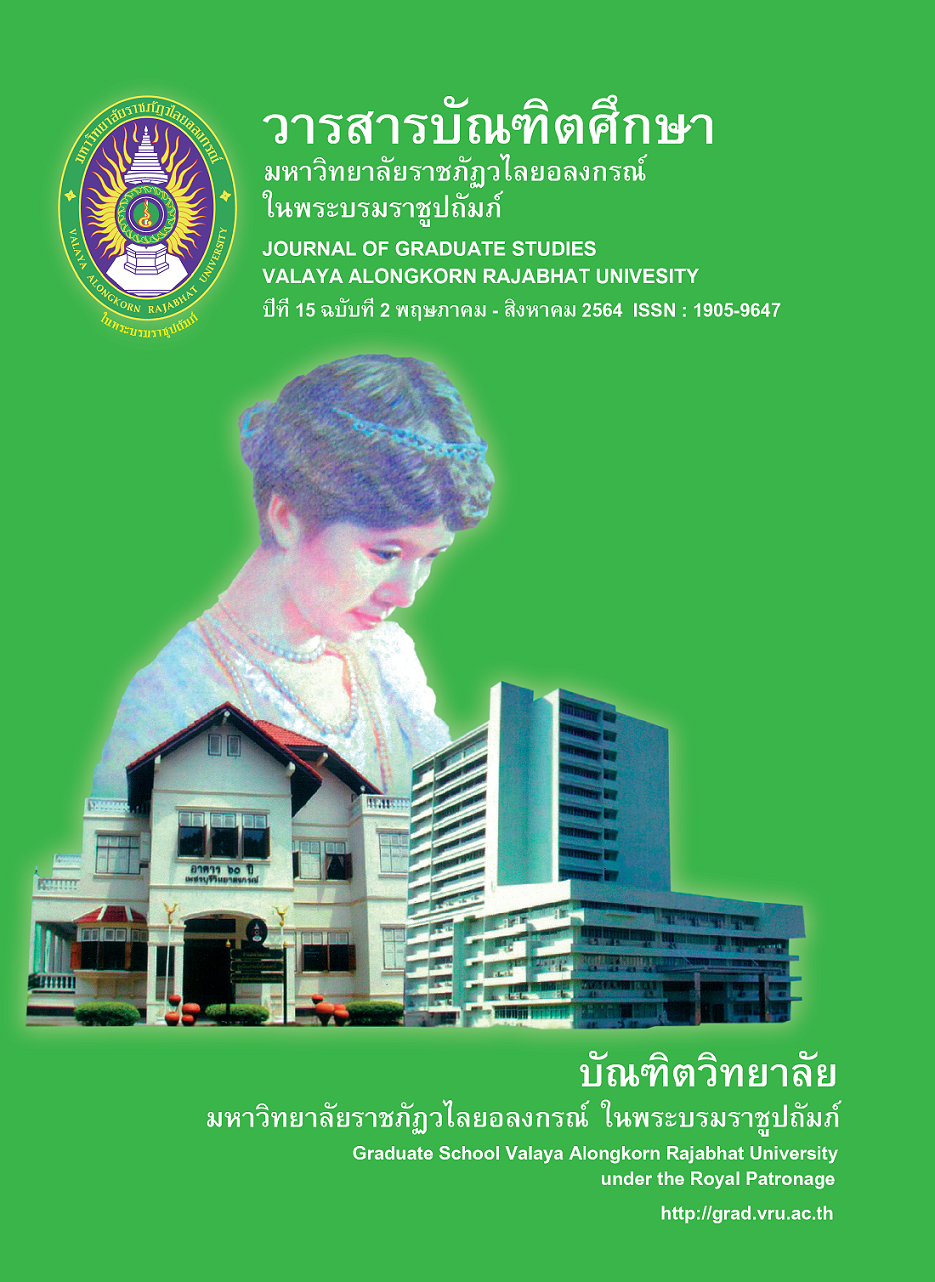THE DEVELOPMENT OF BUDDHIST INSTRUCTIONAL MODEL OF MINDFULNESS BASED LEARNING FOR ELEMENTARY EDUCATION LEVEL IN MODERN THAI SOCIETY
Main Article Content
Abstract
This study aimed at 1) developing a Buddhist instructional model of mindfulness based learning for elementary school students in modern Thai society, 2) to determine the efficiency of the Buddhist instructional model of mindfulness based learning, and 3) to determine the effectiveness of the Buddhist instructional model of mindfulness based learning. The subjects of the study were 30 students who were in Grade 4 during Academic Year 2019. The statistics used in analyzing the quantitative data were mean, percentage, and dependent t-test. The qualitative data were analyzed using content analysis.
The findings of the study were 1) The Buddhist instructional model of mindfulness based learning consists of 7 steps: (a) mindfulness development, (b) reflection on concepts and experiences, (c) wisdom development, (d) holistic practice, (e) refinement and conclusion, (f) putting awareness on Buddhist principles into practice, and (g) sharing experiences and learning together. The instruction model was named “Mindfulness Based Learning Model (MBL)”. 2) The experts’ evaluations on the efficacy of the instruction model was at ‘very high’ level ( = 4.79, S.D.=0.32, full score = 5). 3) The posttest scores of the students on disciplines in learning, social skills, attitudes towards learning, and problem solving ability were significantly higher than those of the pretest scores at .01 level of significance.
Article Details

This work is licensed under a Creative Commons Attribution-NonCommercial-NoDerivatives 4.0 International License.
บทความทุกเรื่องได้รับการตรวจความถูกต้องทางวิชาการโดยผู้ทรงคุณวุฒิ ทรรศนะและข้อคิดเห็นในบทความ Journal of Global of Perspectives in Humanities and Social Sciences (J-GPHSS) มิใช่เป็นทรรศนะและความคิดของผู้จัดทำจึงมิใช่ความรับผิดชอบของบัณฑิตวิทยาลัย มหาวิทยาลัยราชภัฏวไลยอลงกรณ์ ในพระบรมราชูปถัมภ์ กองบรรณาธิการไม่สงวนสิทธิ์การคัดลอก แต่ให้อ้างอิงแหล่งที่มา
References
Jacobs, M. P., & Fiese, B. H. (2007). Family mealtime interactions and overweight children with asthma: Potential for compounded risks. Journal of Pediatric Psychology, 32(1), 64-68.
Khemmani, T. (2016). thit nā khǣm manī [Teaching science: Knowledge for effective learning process management]. (20th ed). Bangkok: Chulalongkorn University.
Office of the Education Council. (2017). samnakngān lēkhāthikān saphā kānsưksā [National education plan 2017-2036]. (2nd ed). Bangkok: phrik wan Graphic design.
Office of the Education Council. (2019). samnakngān lēkhāthikān saphā kānsưksā [National educational standards 2018]. Bangkok: 21 Century Company Limited.
Phra Brahmagunabhorn (P. A. Payutto). (2004). phra phrom khunāphō̜n (Por A. payuttō) [Know the principles first, then study and teach to be effective]. (2nded). Bangkok: Teachers Council of Thailand Printing.
Phra Brahmagunabhorn (P. A. Payutto). (2005). phra phrom khunāphō̜n (Por A. payuttō) [Towards Buddhist education]. (6th ed). Bangkok: Publisher Dharma.
Phra Brahmagunabhorn (P. A. Payutto). (2009). phra phrom khunāphō̜n (Por A. payuttō) [General education for humanity]. Bangkok: General Education Management Center, Srinakharinwirot University.
Phra Dhammapitaka (P. A. Payutto). (2002). phrathampidok (Por A. payuttō ) [The holistic development of Thai children]. (3rd ed). Bangkok: Publisher Dharma.
Phra MahaHansa Dhammahaso. (2020, February 15). phra mahā hansā mahā [Mindfulness Based Learning Model].
Phucharoen, W. (2020). Vorapatr phū čharœ̄n [Mindfuiness in Action: Can practice the mind easily easily again]. Bangkok: Amarin Dharma.
Somdet Phra Nyanasamvara Somdet Phra Sangharaja Sakalamahasanghaparinayaka. (2013). somdet phra yān sangwō̜n somdet phrasangkharāt sakonmahāsangkhaparināyok. [NyanasamvaraDham: Characteristics and important teachings of Buddhism]. Nakhon Pathom: Sal printing.
Somdet Phra Phutthakasachan (P. A. Payutto). (2018). somdet phra phut khōsā čhā (Por A. payuttō) [Educational concepts of Somdej Phra Buddha Kochachan (Por. Payutto)]. Ang Thong: Worasin Fine Printing.
Suthasinobon, K. (2016). kitti chai suthāsinōbon [Buddhist teaching and learning for moral development for learners]. (2nd ed). Bangkok: Commercial World Media Company Limited.
Reigeluth, C. M. (1983). Instructional-design theories and models: An overview of their current status. New Jersey: Lawrence Erlbaum Associates.


